|

songs | interviews | photos | tours | boots | press releases | timeline
Sunday Magazine (Australia)
The Sunday Telegraph
July 12, 1998
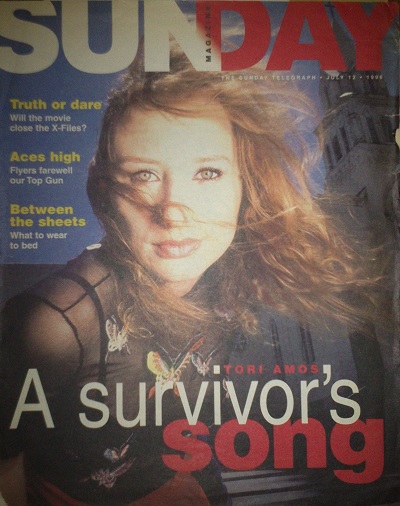
Hope and Tori
She sings about things most women barely talk about: rape, despair, imaginary conversations with God. She has lost a child -- almost lost her mind -- and gained a husband. Now, Tori Amos tells CHRIS SMITH what the light is like at the end of the tunnel
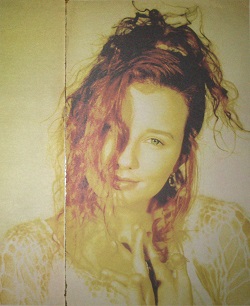
photo: Alastair Thain
Rape, masturbation, the desire to hurl ex-boyfirends into a volcano. Tori Amos had never dodged a raw emotion in her life or in her music. Then came a moment so painful and stark it threatened to drown even the gusty Amos in a deluge of hurt. Her words usually flow freely. But today, sitting in her New York hotel suite, Amos speaks softly, haltingly, as she makes a startling admission just five minutes into our meeting. "There's really no getting around it," she begins slowly. "At this point, I'm talking about it more than feels natural. But, um, I was pregnant at the end of my last tour. And I miscarried at three months. So it was very...."
Amos doesn't complete the heartbreaking memory. Instead, her intense, moss green eyes lock onto mine as she whispers, "The songs started coming." They always do for her. Ever since she was Myra Ellen Amos, a 4-year-old classical piano prodigy in suburban Washington, D.C., music has been her savior, language, weapon, lover. From The Choirgirl Hotel, her new album, is no substitute for a healthy baby. But it is a bold musical statement of sadness, rage and an impressive amount of resiliency.
"Right after (the miscarriage) happened, being able to get from the kitchen to the bathroom to the bedroom again, to sit outside, that was the best I could come up with," says Amos, 34, whose ghostly pale face has a slightly weathered, real-woman beauty that adds to the poignancy of her words. "Besides the emotional loss, you're crashing on so many levels. And the drugs don't take away the pain. Crawling into the pain (through the music) was the only way out, if that makes any sense."
This isn't the first time Amos has examined a personal tragedy through her music. The song "Me and a Gun" from her debut album, 1992's Little Earthquakes, was a chilling account of her being raped by an acquaintance when she was in her early 20s. The song resulted in such an emotional outpouring from fans that Amos went on to establish the Rape, Abuse and Incest National Network, a support group for victims. Under The Pink (1994) a platinum seller, added to her fervent female following with songs like the teasing "God" (in which Amos asks him, "Do you need a woman to look after you?") Her last album, 1996's Boys for Pele, was a bittersweet farewell to her boyfriend of six years.
"The music industry does strange things to people," says Amos' friend Maynard James Kennan, lead singer of the mosh-metal band Tool. "People trot out their cuts and bruises like sales points in a marketing campaign. Tori's managed to embrace her whole life experience without compromising and using it cynically."
To that end Amos' new album also explores an emotion rarely found in her previous work: hope. In her darkest days after the December 1996 tragedy, Amos grew closer to Mark Hawley, 34, her longtime sound engineer and the father of the child she lost. "We were the only two people that could really talk to each other about it." she says somberly. "We never slept. We couldn't sleep. We'd sleep in the day sometimes, because you don't want to see the sun."
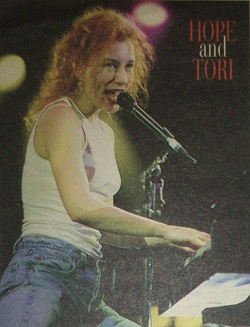 Amos and Hawley were married in February in a small stone church north of London, not far from where he grew up and they both now live. Hawley has brought a new strength and joy into Amos' life, and she giggles as she reluctantly describes their wedding. "Got a nice ring," she says, displaying a flash of diamond "Couple of 'em! It was really magical. He asked me, and I said yes. It was that simple. We're kind of shy about it. It's our little treasure."
Amos and Hawley were married in February in a small stone church north of London, not far from where he grew up and they both now live. Hawley has brought a new strength and joy into Amos' life, and she giggles as she reluctantly describes their wedding. "Got a nice ring," she says, displaying a flash of diamond "Couple of 'em! It was really magical. He asked me, and I said yes. It was that simple. We're kind of shy about it. It's our little treasure."
According to her father, the Rev. Amos, the wedding was moving and traditional, with Dad walking his little girl down the aisle of the church. Tori insisted he remain off-duty. She said, "Dad you are just to be dad today," he recalls.
A church wedding isn't what you'd expect from a woman whose loud, witty rebellion against organized religion began as a teen-ager and shows few signs of relenting. "The Christian God, he's very interested in what people are doing in their bedrooms and their bathrooms," says Amos. "I have margaritas with him every Friday night when I'm not busy. But the thing is, I lovingly call him Peeping Tom. Because I'm like, 'Get out of my bedroom unless you bring a condom!'"
The Rev. Amos has learned to stay calm when he hears such blasphemous Tori-isms. "I'd like to correct the misperception that Tori was reared in some sort of fire-and-brimstone fundamentalists tradition," he says evenly. "We preach grace, mercy and love. Tori was raised to be tolerant."
Amos remembers her tumultuous youth a bit differently. "I was crawling out of my skin" is how she outs it. And her homemaker mother, Mary Ellen, admits that life with her opinionated daughter was tense at times. "It was such a struggle," she says. "When things were rough, I'd always tell her, 'don't stop talking to me! I don't care what you say just keep talking to me!' We kept channels open, and that has made all the difference."
Often mocked for her New Age musings, Amos seems to tune to a few extraterrestrial channels as well. "I feel songs are coming to me from across the galaxies to find me sometimes," she says. "They're busy doing something disagreeing with Jabba the Hut somewhere, and then they tear across the universe when I am really in a bad way. Choirgirl is not a victim's record. It is very much about appreciating the life force and trying to connect with this being I had become connected to but I can't find anymore."
From The Choirgirl Hotel is also the first album Amos has recorded live in a studio, with drums and electric guitars. It rocks harder than her previous work - a surprising choice, given that tragedy is set to pulsating computer-sampled electronic dance beats. "I would sit outside by the water a lot," says Amos when asked about the album's rock influence. "I have a little tiny dock on the river, sort of like Huckleberry Finn. Sorrow came and sat down next to me. And she would come and hold my hand, and I really began to see that sorrow understands tears. But she also likes going to raves, and she's very multidimensional. And I started to see the depth of sorrow and that there's so much calmness in being able to see all sides of it. And I started dancing with sorrow. That's when I started, in my mind, to go with the rhythm."
Now Amos has taken her sensuous percussive show on the road for more than 200 highly charged solo concerts - none of that laid back Lilith Fair stuff for her. "I'm probably at the peak of my career right now," she says. "As a hunter, as a lioness, I'm still one of the great hunting lions out there in the pride. But I see the other young hunters coming up, and I look at them, and I see their talent and I see their instincts. And I smile. I know it's going to be their turn soon to get the meat for the pride. But right now, I feel like I'm the one bringing the meat to the table."
Amos gazes out the window of her 44th floor hotel suite. The weather today is wet and windy - so gothically gloomy that the plate glass is being kissed by gusts of fog. Amos, of course, has a different take on the storm. "A rainy day," she says dreamily. "I just see blue umbrellas and yellow platform-heel galoshes. The vision of what rain looks like, what she look like, is just so beautiful to me that every time it rains I smile." Just then there's an audible plink plink of water against the windows. Rain, it seems, loves her back.
original article
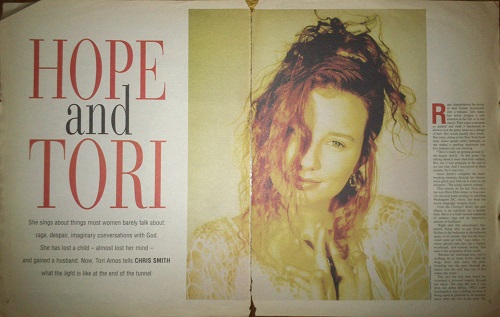
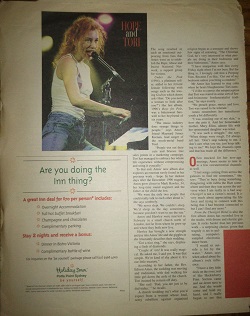
* this article also appeared in the July 1998 issue of Us magazine
t o r i p h o r i a
tori amos digital archive
yessaid.com
|